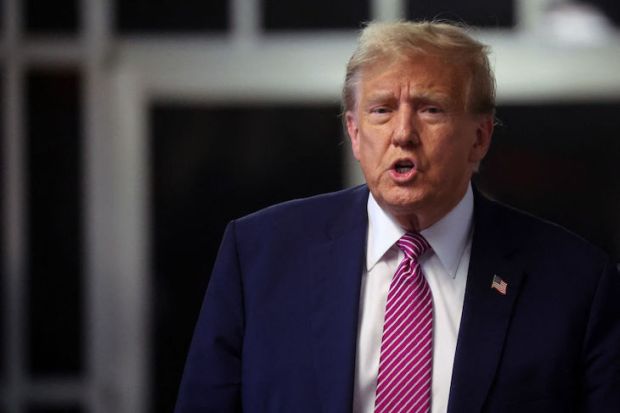In the last week, I’ve been crisscrossing the United States, meeting with politicians and their advisers ahead of this year’s congressional elections. Almost everyone has asked me about the ongoing Boris Johnson saga. Their most common refrain is surprise: how can the simple act of attending a party prompt a prime minister’s ever-more-likely political demise? In a country where every scandal bounced off Donald Trump, it is hard for Americans to imagine a few sausage rolls and glasses of warm wine in Downing Street causing so many to turn on the Prime Minister.
In America, loyalty to Trump persists. More than 70 per cent of Republicans continue to back him, and four in ten doubt whether Joe Biden was legitimately elected. Love him or loathe him, Trump has a base in the country that makes his position in the Republican party untouchable.
By contrast, condemnation of Boris Johnson in the UK is edging close to universal. The recent focus groups my company have ran are by far the worst I have witnessed for a prime minister, including in the dying days of Theresa May’s premiership. ComRes found earlier this week that seven in ten voters want the Prime Minister to resign. Conservative party voters are more supportive but not by much, and large numbers of Tory voters no longer approve of the PM’s performance.
While Trump has a solid 40 per cent or so who will support him almost regardless of what he does, this number is only around 8 per cent for Boris Johnson.
Why? Britain is not America. Though our elites in parliament and avid tweeters are at each other’s throats, there is a distinct lack of polarisation when it comes to the wider public. If I do a focus group one evening with young graduates in Enfield Southgate, followed by one with pensioners in Wakefield, they essentially discuss the same things: the cost of living and concern about the NHS backlog.
The salience of Brexit has receded, falling to low levels in the recent Ipsos-Mori issue tracker. It might be hard for those still entrenched in the Brexit wars to believe, but I can run a focus group for 90 minutes and the B word will not be uttered once.
Of course different people have different views, particularly based on age and education levels.
Nor are we immune from the threat of division and rancour. The Pew Research Centre has shown that polarisation amongst elites and the media came first in the US with highly commercialised divides in the media which then bled through to the public over a period of 20 years. Add a dose of Facebook and Twitter, and a figure like Donald Trump, and the divides could yet harden here.
But for now it is easier to cross ideological boundaries in Britain. Wakefield really is more similar to Enfield than it is different. And the public are capable of holding seemingly contradictory views at the same time. In a recent focus group, I spoke to very socially conservative voters. They had strong views on Black Lives Matter, but when I asked them about trans issues they were practically activists in their support for trans rights. That is close to unthinkable in America, where someone’s overall position tends to dictate their view of everything that follows.
The logic follows that British politicians can cross those divides too. Many Republican operatives believe Trump is here to stay because without him it will be impossible for the party to keep its new working-class supporters. This is not the case with Boris Johnson. Voters who gifted the Conservatives the Red Wall did like Boris, but the reasons they liked him have now become a weakness for the PM. The real damage of the parties scandal is not the deed itself, but the fact that these same Red Wall voters are now less likely to describe him as strong, as someone who says what he means, and as someone who can get things done.
Another politician, Labour or Conservative, can strike this same chord and qualities. Rishi Sunak already does; because voters feel he ticks these boxes, he has a net approval rating of +22 in the Red Wall, compared to Boris Johnson’s -28.
Some Tory MPs and social media supporters continue to aggressively support Boris Johnson. But in the country, from leafy seats in the south to the post-industrial north, the voters have made up their minds. Boris has lost his charm – far from being celebrated, he is now despised.
If he is removed, it will not take away an imagined holy grail of Tory support. So un-American is our political culture, that most voters will barely mention him a few months afterwards.
In our uniquely British climate, the biggest risk for the Conservative party is not getting rid of Johnson, but keeping him in post.
Got something to add? Join the discussion and comment below.
Get 10 issues for just $10
Subscribe to The Spectator Australia today for the next 10 magazine issues, plus full online access, for just $10.

















Comments
Don't miss out
Join the conversation with other Spectator Australia readers. Subscribe to leave a comment.
SUBSCRIBEAlready a subscriber? Log in